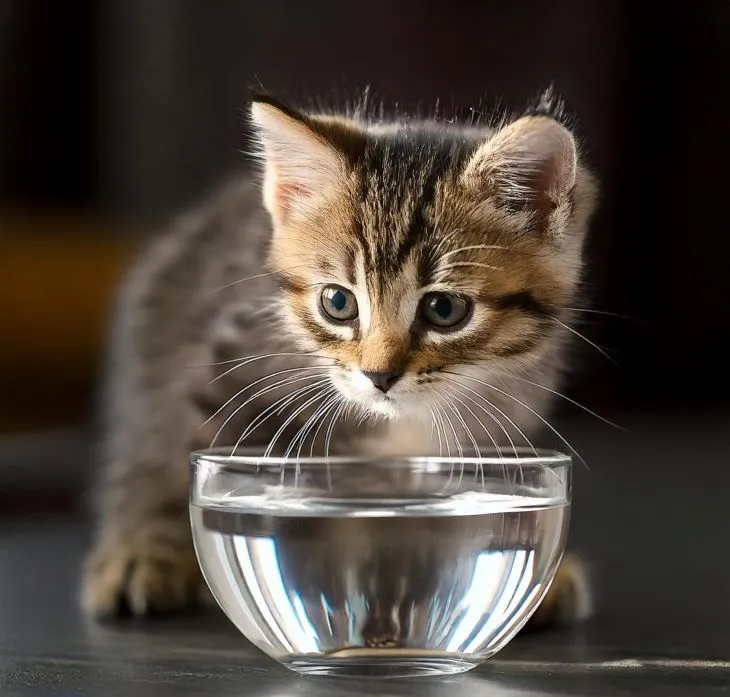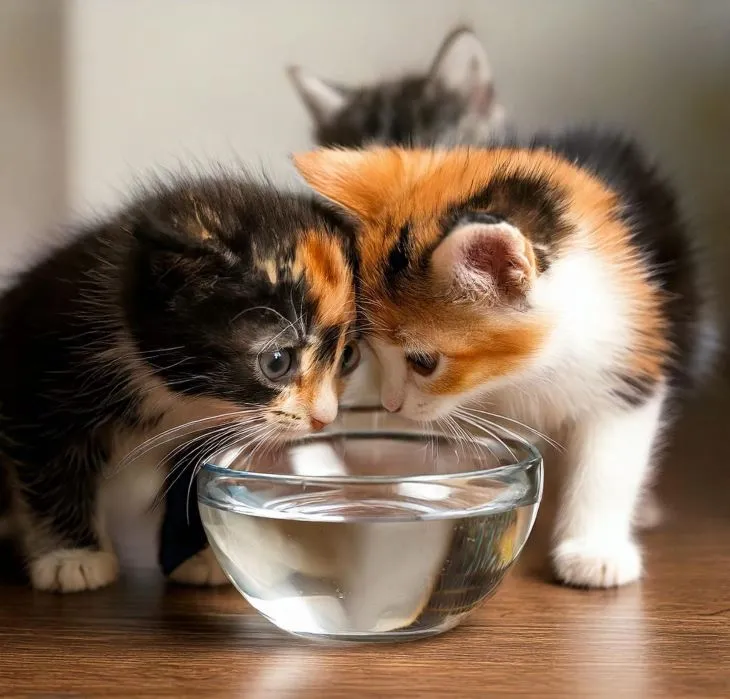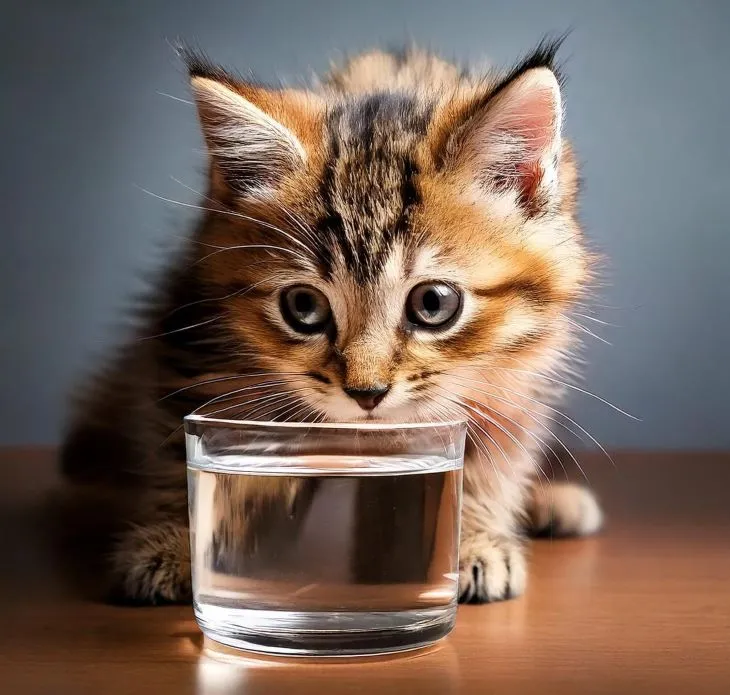My Kitten Not Drinking Water? Causes, Signs & Solutions You Need To Know
By: Elizabeth Rikas

The information in this article is intended to educate cat parents and is not a substitute for veterinary guidance. In case of any concerns about your cat’s health, please talk with your veterinarian.
Kittens drink less water than many animals, therefore keeping them hydrated is critical for maintaining their growth and health. Even minor neglect can lead to dehydration, impacting their energy and overall well-being. If your kitten is not drinking water, understanding the causes and applying the right solutions is crucial. This comprehensive article explores why kittens might avoid drinking water and provide actionable solutions for pet parents.
Why Hydration Is Vital For Kittens
Water is more than just a basic necessity; it plays a vital role in your kitten’s health and development:
- Digestion: Helps break down food and absorb nutrients effectively.
- Kidney Function: Assists in filtering toxins and maintaining electrolyte balance.
- Temperature Regulation: Prevents overheating during play or hot weather.
- Joint Health: Lubricates joints for agility and movement.
How Much Water Should My Kitten Drink
On average, a kitten requires 3.5–4.5 ounces of water daily per 5 pounds of body weight. This includes water obtained from food, particularly wet food, which is 70–80% water. Ignoring hydration needs can result in dehydration, leading to severe health risks, including organ damage.
Signs Of Dehydration In Kittens
Recognizing dehydration early can prevent complications. Key symptoms include:
Physical Symptoms:
- Tacky, dry gums.
- Reduced skin elasticity (skin stays tented when pinched).
- Sunken eyes.
Behavioral Changes:
- Lethargy or decreased energy levels.
- Poor appetite or refusal to eat.
Urinary Symptoms:
- Reduced urination frequency.
- Dark-colored, concentrated urine.
If dehydration symptoms persist or worsen, immediate veterinary intervention is necessary.
Why Kittens May Avoid Drinking Water

Understanding why your kitten not drinking water is the first step toward resolving the issue. Here are the main causes:
1. Dietary Factors
- Wet Food Diets: Wet food provides significant moisture, reducing a kitten’s need to drink separately. This isn’t inherently harmful but warrants monitoring.
- Dry Kibble Challenges: Kittens fed mainly dry food need supplemental water to balance their hydration levels.
2. Environmental Factors
- Unfamiliarity with Water: Young kittens transitioning from milk may not recognize water as a hydration source.
- Inappropriate Water Placement: Placing water bowls near litter boxes or in high-traffic areas can deter kittens from drinking.
3. Water Bowl Issues
- Bowl Material: Plastic bowls can retain odors or bacteria, making water unappealing.
- Bowl Design: Deep or narrow bowls can cause whisker fatigue, discouraging drinking.
- Stale Water: Cats dislike stagnant or unclean water. They may also be sensitive to Strong smells (e.g., chlorine in tap water) and Unpleasant temperatures (most prefer room-temperature water).
4. Health Problems
Medical issues such as dental pain, kidney disease, or upper respiratory infections can make drinking water difficult or uncomfortable. Always consult a vet if you suspect health-related causes.
Click to know: How Many Teeth Do Cats Have?
How To Hydrate A Kitten That Won’t Drink Water
If your kitten isn’t drinking enough water, try these proven methods:
Step 1: Improve Water Quality And Presentation
- Clean and refill water bowls daily to ensure freshness.
- Use filtered or bottled water to avoid unpleasant tap water tastes.
- Invest in a pet water fountain—many cats prefer moving water due to its perceived freshness and safety.
Step 2: Experiment With Bowl Types And Placement
- Opt for ceramic, stainless steel, or glass bowls instead of plastic.
- Place multiple water bowls around the house, away from food and litter boxes, for easy access.
Step 3: Enhance The Appeal Of Water
- Add a small amount of low-sodium chicken or fish broth for flavor.
- Include tuna water or diluted goat’s milk sparingly.
Step 4: Incorporate Hydrating Foods
- Mix wet food with a small amount of water to boost moisture content.
- Offer hydrating treats like cucumber slices or seedless watermelon.
- Serve unseasoned bone broth as an occasional treat.
Step 5: Make Drinking Fun
Encourage drinking through play by:
- Adding floating toys to shallow water bowls.
- Letting kittens interact with ice cubes, which can double as toys and hydration sources.
Myths About Kittens And Water

1. “Milk is Enough”
Once weaned, kittens need water as their primary hydration source. Milk can upset their stomachs and should not replace water.
2. “Cats Don’t Need Much Water”
While cats have a lower thirst drive, they still require adequate water to prevent kidney issues and urinary tract problems.
3. “Running Water Is Just A Preference”
Kittens’ preference for moving water stems from instincts; in the wild, running water is less likely to be contaminated.
When To Consult A Veterinarian
If you’ve tried improving your kitten’s water intake without success, professional help may be needed. Seek veterinary attention if:
- Your kitten hasn’t drunk water for more than 12 hours.
- Dehydration symptoms persist after interventions.
- Your kitten shows additional signs, such as vomiting, diarrhea, or extreme lethargy.
Veterinarians can conduct tests to rule out underlying health conditions and suggest advanced hydration techniques if needed.
Fun Trivia: Can you spot the differences between Male and Female Cats
Expert Tips For Busy Pet Owners
Here are some quick strategies to make hydration easier for your kitten:
- Automatic Water Fountains: Ensure a consistent supply of fresh water without frequent refills.
- Scheduled Maintenance: Set reminders to clean and refill water bowls.
- Behavioral Monitoring: Regularly observe your kitten’s drinking habits and activity levels.
Frequently Asked Questions
Final Thoughts
A kitten not drinking water can seem daunting, but with patience and the right strategies, you can ensure they stay healthy and hydrated. By addressing possible causes like bowl type, water quality, and dietary habits, you’ll support your kitten’s overall well-being. Don’t hesitate to consult your veterinarian for persistent issues or medical concerns.

About the Author
Elizabeth Rikas
Elizabeth is a passionate advocate for feline health and well-being, drawing from her years as a dedicated pet parent to three cats—Gypsy, Swan, and Alfred—and her invaluable experience volunteering at animal shelters. A seasoned writer with a lifelong love for cats, Elizabeth began sharing her insights in her teens and has since contributed extensively to platforms focused on feline care. Through her expertise and heartfelt dedication, she empowers pet owners with practical advice and research-backed knowledge to nurture their furry companions.
